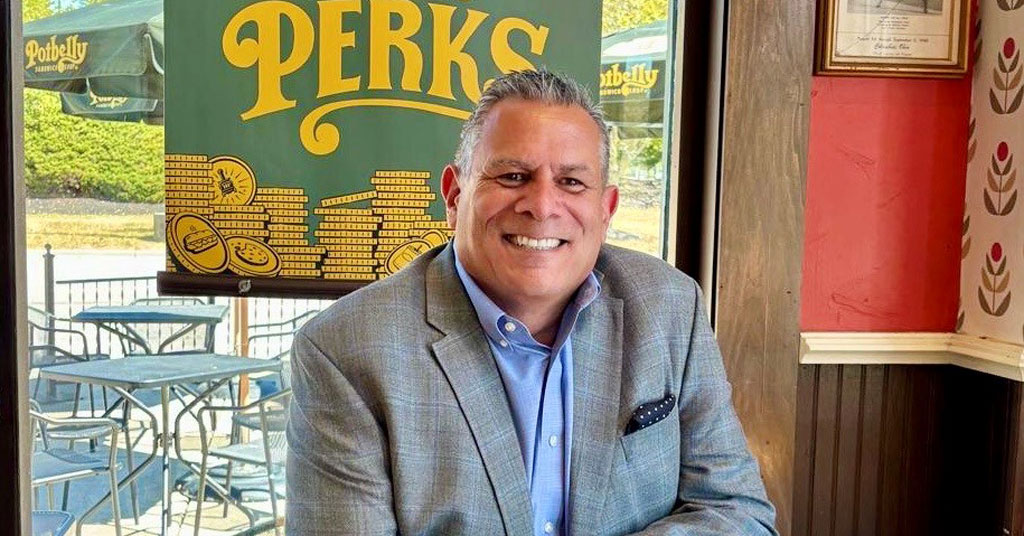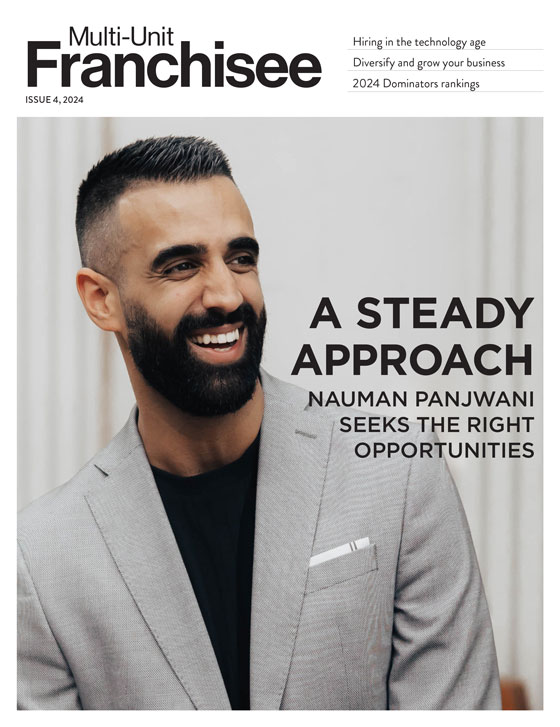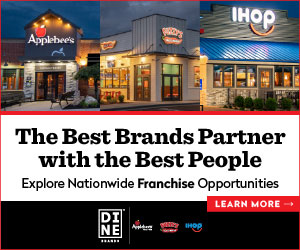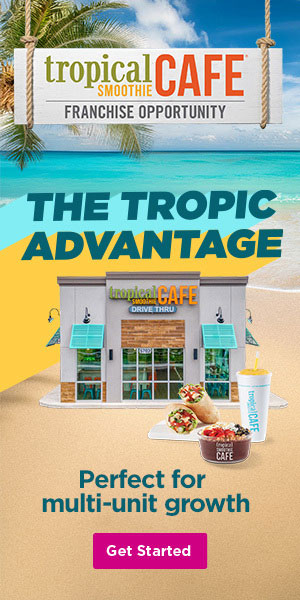Burger King Royalty: CEO goes from Retail to Restaurants

Name: Randy Pianin
Title: CEO
Company: Royal Restaurant Group
No. of units: 61 Burger King, 4 Potbelly
Age: 61
Family: Wife Amy and two children, Drew and Jennifer
Years in franchising: 8
Years in current position: 1.5
Randy Pianin's family worked in the apparel industry, so it's no surprise that one of his first jobs was in retail. That early exposure to the industry formed an interest in the business world that carried him through more than three decades in finance and accounting before leading him to his current role as CEO of Royal Restaurant Group, a company with a portfolio of more than 60 restaurants.
Pianin established a long and successful career in accounting for publicly and privately owned companies in the restaurant, retail, transportation, e-commerce, consumer products, and services industries. While auditing Arby's, he gained his first experience of QSR finances.
"There are a lot of similarities between restaurants and retail businesses," Pianin says. "Restaurants have thousands of small transactions each day and have many locations and employees. Execution is even more important in the restaurant because the product is the same. Site selection and execution are paramount. I understood the model after so much time in multi-unit retail."
In 2016, Pianin became CFO of JAE Restaurant Group, a company that owned 180 Wendy's restaurants, and was named CEO three years later. After the ownership sold the company following the Covid pandemic, Pianin formed the Royal Restaurant Group in 2023. The group owns 61 Burger King restaurants and four Potbelly locations.
His extensive background in finance and accounting provided the foundation for franchise ownership. He oversees the operations of all the units. For Burger King, plans include remodeling 25 restaurants and turning around underinvested locations. He is also excited about acquiring Potbelly locations to add to the group's portfolio. Pianin says he runs the business with a strong entrepreneurial mindset.
"I would rather determine my fate than have it dictated to me," he says.
Personal
First job: When I was a teenager, I cut lawns and cleaned pools in Long Island, New York. I later moved to working in retail.
Formative influences/events: I was always intrigued by the business world. My family background is in the apparel business, so retail and interacting with customers was probably something that I was exposed to early on. It intrigued me.
Key accomplishments: Personally, it was becoming a father. But moving into the professional world, obtaining my CPA license was a big accomplishment. I'm also proud of my undergraduate degree from Emory University and my MBA from Columbia University. My greatest business accomplishment was starting Royal Restaurant Group.
Biggest current challenge: We did four acquisitions in one year, so it's bringing the four separate companies together and integrating them into one company. Part of that challenge is merging four different cultures and how we want them to operate into one cohesive unit. Most of the stores we have acquired were underinvested restaurants, whether it was a result of resources, training, or operational leadership. We are now spending the time and money to turn those into successful units.
Next big goal: Completing the integration successfully and continuing to grow. We are looking to add more Potbelly restaurants in the next several years. For Burger King, we will be remodeling 25 restaurants. That will be a primary avenue of growth and open up additional opportunities.
First turning point in your career: I got my MBA while I was working at Deloitte & Touche. It was a program where if you could get into Columbia University, they would allow you to go to school full-time for part of the year and work full-time part of the year. This was a turning point because it allowed me to get the MBA, and it exposed me to different areas of business and finance.
Best business decision: It's always surrounding yourself with good people and surrounding yourself with people who help you carry out the mission. It is also important to surround yourself with good people above you so that you have someone to learn from.
Hardest lesson learned: Not compromising your ethics and integrity may make the journey to the top longer but is definitely worth it.
Work week: I'm in market several times every month, but my week really depends on what's going on in each one of the businesses. I meet with my direct reports once a week individually, and I have a senior leadership team meeting once a week as well. A big part of my day-to-day is looking at data to understand how we're doing and what needs attention and making educated decisions based on performance.
Exercise/workout: Walking is what I do the most.
Best advice you ever got: Life begins outside your comfort zone. I am a finance guy at heart, but at various times in my career, I have taken on other roles in operations to become more well-rounded. Regardless of your background, when you run a business, you are responsible for delivering the overall results.
What's your passion in business? Developing people and growing businesses. I love to see people start with a company, develop a role, and take on more responsibility. We keep telling employees that we are a growing business, and there are opportunities for them to invest in a career. It is exciting to grow a business and leverage resources. The larger you get in a franchise system, the more influence you have and the more you can contribute to directing the system.
How do you balance life and work? It's a constant challenge. We have an organizational structure and processes to manage day-to-day issues, but sometimes, you have to jump in. When you own a business, you can never completely turn it off. If larger problems come along, you must deal with them. When you are a leader of people, you can attempt to work just 40 hours, but you still have to address the demands of the business. I am fortunate to have a supportive family. When work demands eat into family time, they are very understanding.
Guilty pleasure: I have a sweet tooth. I don't know if it's a guilty pleasure, but I'm a big hockey fan.
Favorite book: I like to read fiction and to escape. My favorite authors are Nelson DeMille and Harlan Coben. The Charm School and Plum Island by DeMille and the Myron Bolitar series by Coben are some of my favorites.
Favorite movie: "The Big Chill."
What do most people not know about you? I'm more of an introvert.
Pet peeve: Liars.
What did you want to be when you grew up? To own my own business. I was influenced by my family's background in the apparel business. The thought of operating in retail intrigued me. I wanted to determine my own destiny and feel a sense of accomplishment with business ownership.
Last vacation: I went to Alaska in the summer.
Person you'd most like to have lunch with: My father, who passed away several years ago.

Management
Business philosophy: At our company, we're trying to be an employer of choice. We believe that if our employees are happy at Royal Restaurant Group, they'll provide great service to our customers, and we'll become their top option. If we are a restaurant of choice, we can deliver strong sales and profits and become an attractive investment. We will also generate the funds needed to reinvest in our employees and restaurants.
Management method or style: I give people direction and goals to achieve. I will periodically check on them, but I'll also give them space to work. I can provide support but can also step in when needed. I don't like to micromanage, and people don't like to have someone hover over their every move.
Greatest challenge: Time. There are just not enough hours in the day. It is important to have the right people in the right roles and delegate to them. That can take some of the pressure off. We try to become more efficient and figure out the best roles for people. We outsource our accounting processes, which helps and allows us to scale the business.
How do others describe you? Determined, fair, supportive, hardworking, and ethical.
Have you ever been in a mentor-mentee relationship? What did you learn? Yes, I have. One of the things I discovered as a mentor is that you learn a lot from your mentee. I don't think everyone realizes that when they decide to go into being a mentor.
One thing you're looking to do better: Optimizing the customer experience is something that we're constantly trying to improve, and it can be a never-ending battle. You can always be better. We want to exceed customer expectations, and that can come through friendly employees, clean restaurants, and providing fast, accurate service.
How you give your team room to innovate and experiment: As long as they're taking educated and responsible risks, I'll let them go. If I think that it's veering too far off course or if it's too risky, I'll weigh in. But very rarely do I dictate what people do and how they should do something.
How close are you to operations? Very, very, very close. I speak to my chief operating officer probably three to four times a day. I am in market in both brands several times during the month as well. Without operations, you have nothing, so if you're not involved, your business is at risk.
What are the two most important things you rely on from your franchisor? First are the systems and processes. That's one of the things you're paying royalties for as a franchisee. The second is probably marketing.
What you need from vendors: A partnership. I truly believe that if vendors are helping us succeed, our business is growing, and therefore, theirs is growing as well.
Have you changed your marketing strategy in response to the economy? How? The brand dictates a lot of the broader marketing strategy, and they've shifted more to a value message. Sometimes, this means discounting the product; other times, it's better to explain to the customer the value they're receiving from the experience. What we can do in our restaurants in response to this is improve the customer experience so that when customers decide to come in and when they're strapped for cash, they're getting as good an experience as we can give them.
How is social media affecting your business? Specific to us, social media is a great way to market. There are new and creative ways to get the message out, and it also holds us more accountable. If someone has a bad experience, you know it because it gets broadcast immediately. Hopefully, they're also broadcasting the good stuff.
How do you hire and fire? This varies by level in the organization. In general, we try to be clear on what the roles and responsibilities are for each position. As we're talking to potential new hires, we are trying to assess whether they have the experience needed to meet the needs of the position. We try to assess whether they have the capabilities to develop and grow in the organization. If we've got someone who is struggling, we first ask if they received the necessary training and if they need to be retrained in whatever area they're struggling with. There are times when retraining and coaching don't work. Then you have to decide whether there is another place in the company that they are better suited for.
How do you train and retain? Training is provided by the brand, and we have training that our company will administer. We'll also go outside for other training, such as leadership development training. Retaining employees is a big focus. So, we try to give everybody the tools, training, and knowledge to do their jobs. Additionally, we provide competitive wages and have various recognition and rewards programs. That is key to retaining folks.
How do you deal with problem employees? If the problem is a lack of job knowledge, then we will retrain the employee. If it's an attitude issue, that is harder to change. We are in the hospitality business, and if you don't like dealing with customers, this probably is not the right industry for you. Hopefully, we caught that in the interviewing process, but sometimes, we don't. We try to be fair in the process, but sometimes, employees need to become customers, and that's just the fact of the business.
Fastest way into your doghouse: Dishonesty and lying.
Bottom Line
Annual revenue: More than $90 million.
2024/2025 goals: It's to integrate the four acquisitions, open new and remodeled existing restaurants, and finish building out of the team so that we have the infrastructure to grow. For Burger King, it is reinvesting in the restaurants through remodels, updating the technology, and addressing maintenance needs. We want to open new Potbelly restaurants and build out the organization to support growth in our target markets.
Growth meter: How do you measure your growth? Sales, traffic, and profit.
Vision meter: Where do you want to be in five years? 10 years? To have system-leading performance in each of the brands that we operate. I'd like to continue to grow and open more restaurants as well.
Do you have brands in different segments? Why/why not? The quick-service and fast-casual segments of the restaurant industry are somewhat resilient. Whether the economy is good or bad, people do tend to go out to eat in these segments.
How is the economy in your region(s) affecting you, your employees, your customers? It's impacting us like it's impacting everyone. People are still eating out but not as much as they used to. Customers are looking for value, and they're looking for different options. Value isn't just a discount; they want to feel like they're getting what they pay for. From our employees' perspective, their living expenses are going up, and we try to do things to help them with this. For example, we implemented next-day pay so that employees have access to earned wages the following day, and they don't have to wait until payday.
Are you experiencing economic growth in your market? Economic growth in the market comes from delivering good service and delivering value for the money the customer is spending. Improving the customer experience can come by either opening new stores or remodeling your existing restaurants. You need to give the customer a reason to come to you instead of someone else.
How do you forecast for your business? We look at sales, the number of transactions, and the size of the average ticket. We'll also look at micro and macroeconomic factors to get an understanding of what's happening with the economy as a whole.
What are the best sources for capital expansion? Over my career, I've used different sources, including banks. There are a lot of banks in the franchise space that understand how franchised restaurants, in particular, work and what the peaks and valleys are. Private equity is another avenue that I've used over the years.
Experience with private equity, local banks, national banks, other institutions? Why/why not? We work with groups of banks with experience in the restaurant finance space. We find it beneficial to work with them because they understand the business and our needs. Private equity depends on where you are in the lifecycle of your business. It can provide capital and other resources to help with what you need. We've worked with private equity in the past, and it can be a good partnership.
What are you doing to take care of your employees? We try to provide competitive pay and different ways for them to access that pay. We offer benefits, and we're constantly looking to improve upon them and lower the cost. Ultimately, we're trying to provide a career path for folks so that if they want to put the effort in, and they want to grow with us, they have the opportunity to do so.
How are you handling rising employee costs (payroll, minimum wage, healthcare, etc.)? You have to try and be vigilant on costs all throughout the business to help offset some of the rising employee costs. Labor and food are the two largest components, so you have to try and gain efficiencies wherever you can to help address the rising costs. You can't keep raising food prices to offset the costs. You have to find ways to gain efficiency. So, we're constantly doing that, and as we grow, we can leverage the costs over a broader pool of restaurants.
What laws and regulations are affecting your business, and how are you dealing with them? You've got minimum wage laws and overtime laws, which are two of the bigger ones. We've tried to provide the right pay structure and the right schedule for folks so that we're meeting the laws, meeting the needs of the employees, and meeting the needs of the restaurant. It's a juggling act.
How do you reward/recognize top-performing employees? We have bonus incentive programs in place, so if objectives are met, the employees will share in the increase in sales and profits. There are also miscellaneous customer service metrics that they can earn rewards on. We try to do spot rewards: Catch employees doing something right and recognize them. The other thing is just recognition, which I think people in general crave and employees do as well.
What kind of exit strategy do you have in place? We just started last year. My hope is that our business continues to grow and is around for a long time to come.
Share this Feature
Recommended Reading:
| ADVERTISE | SPONSORED CONTENT |
FRANCHISE TOPICS
- Multi-Unit Franchising
- Get Started in Franchising
- Franchise Growth
- Franchise Operations
- Open New Units
- Franchise Leadership
- Franchise Marketing
- Technology
- Franchise Law
- Franchise Awards
- Franchise Rankings
- Franchise Trends
- Franchise Development
- Featured Franchise Stories
FEATURED IN

Multi-Unit Franchisee Magazine: Issue 4, 2024
| ADVERTISE | SPONSORED CONTENT |

$1,000,000
$300,000





 The multi-unit franchise opportunities listed above are not related to or endorsed by Multi-Unit Franchisee or Franchise Update Media Group. We are not engaged in, supporting, or endorsing any specific franchise, business opportunity, company or individual. No statement in this site is to be construed as a recommendation. We encourage prospective franchise buyers to perform extensive due diligence when considering a franchise opportunity.
The multi-unit franchise opportunities listed above are not related to or endorsed by Multi-Unit Franchisee or Franchise Update Media Group. We are not engaged in, supporting, or endorsing any specific franchise, business opportunity, company or individual. No statement in this site is to be construed as a recommendation. We encourage prospective franchise buyers to perform extensive due diligence when considering a franchise opportunity.